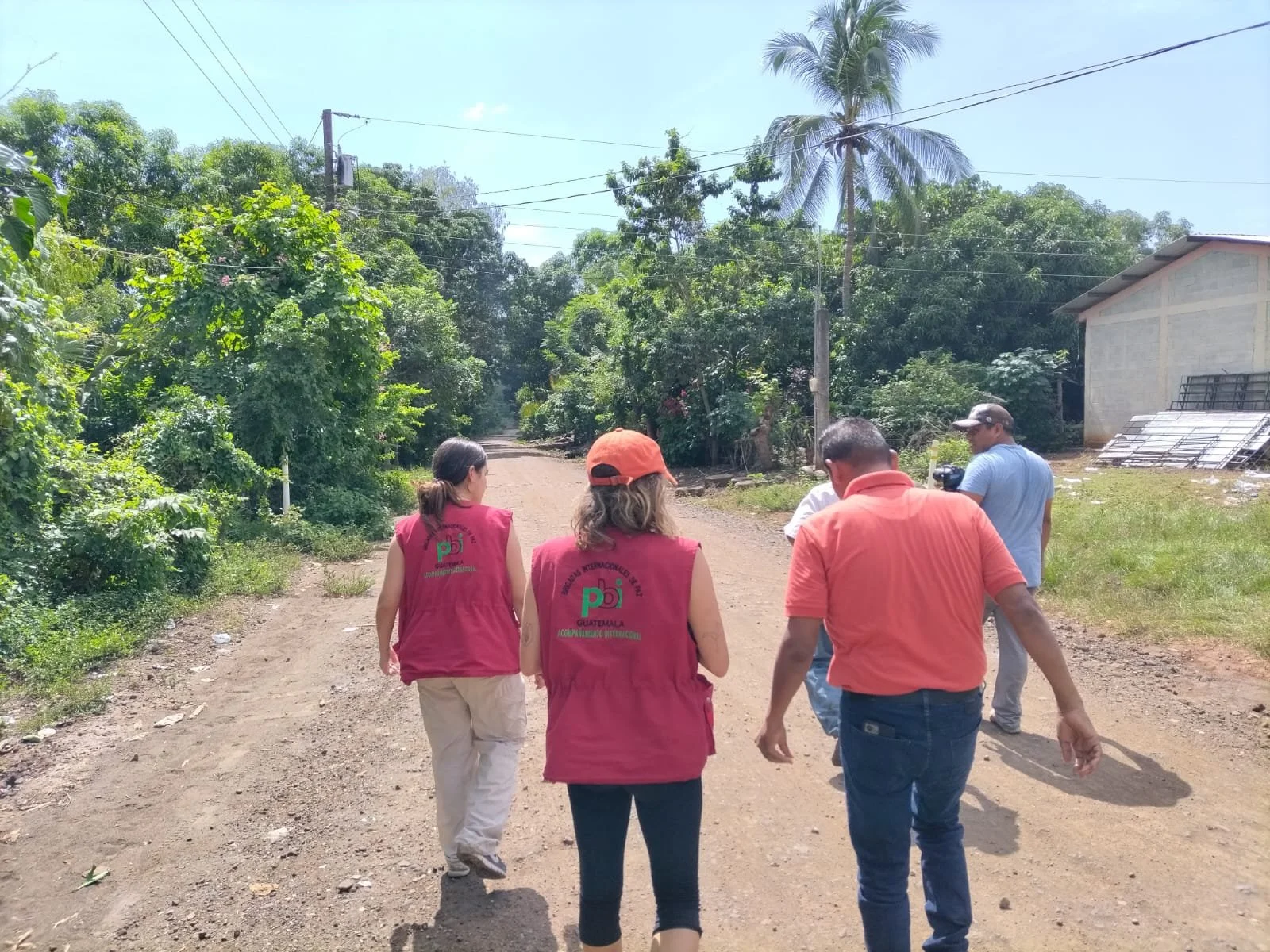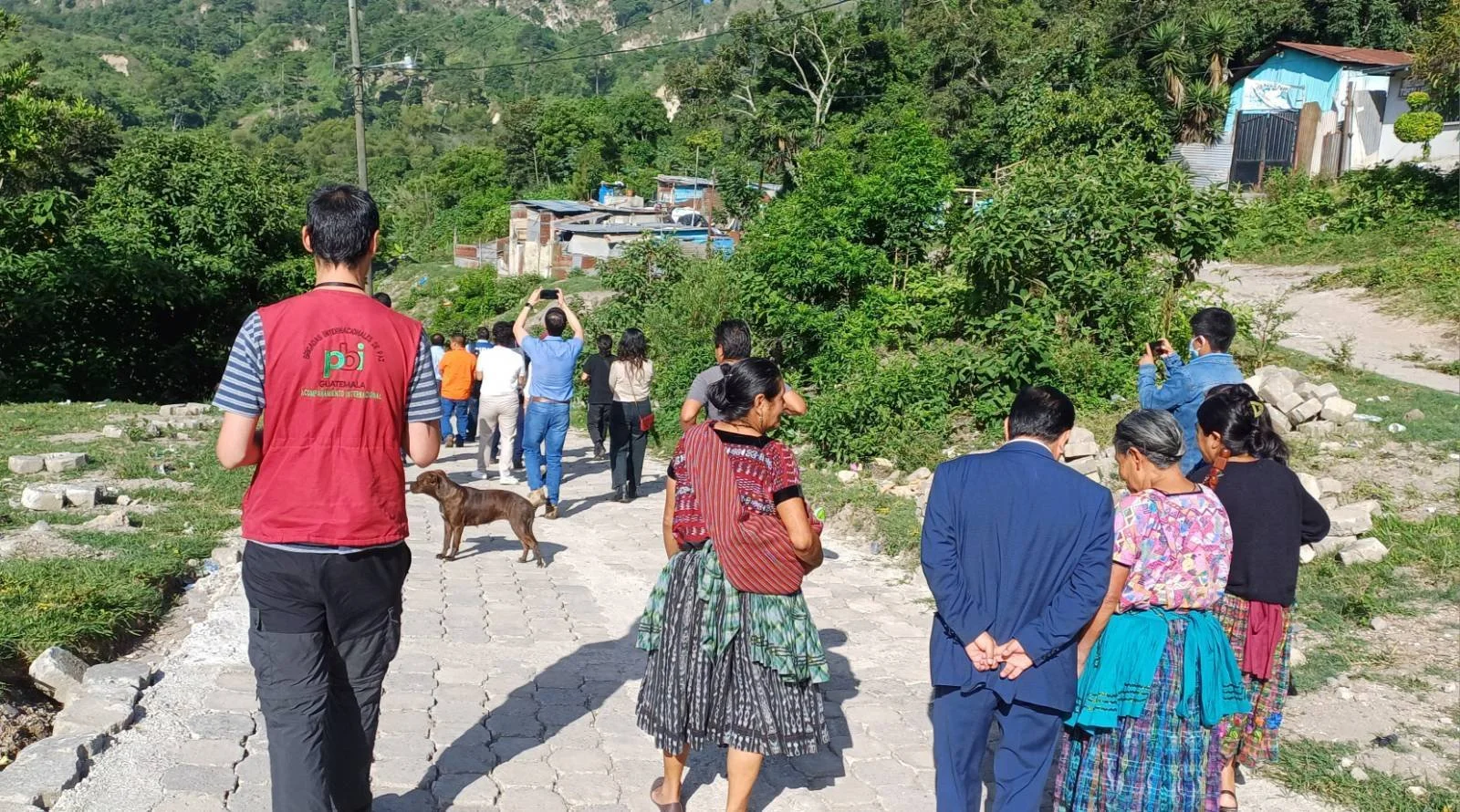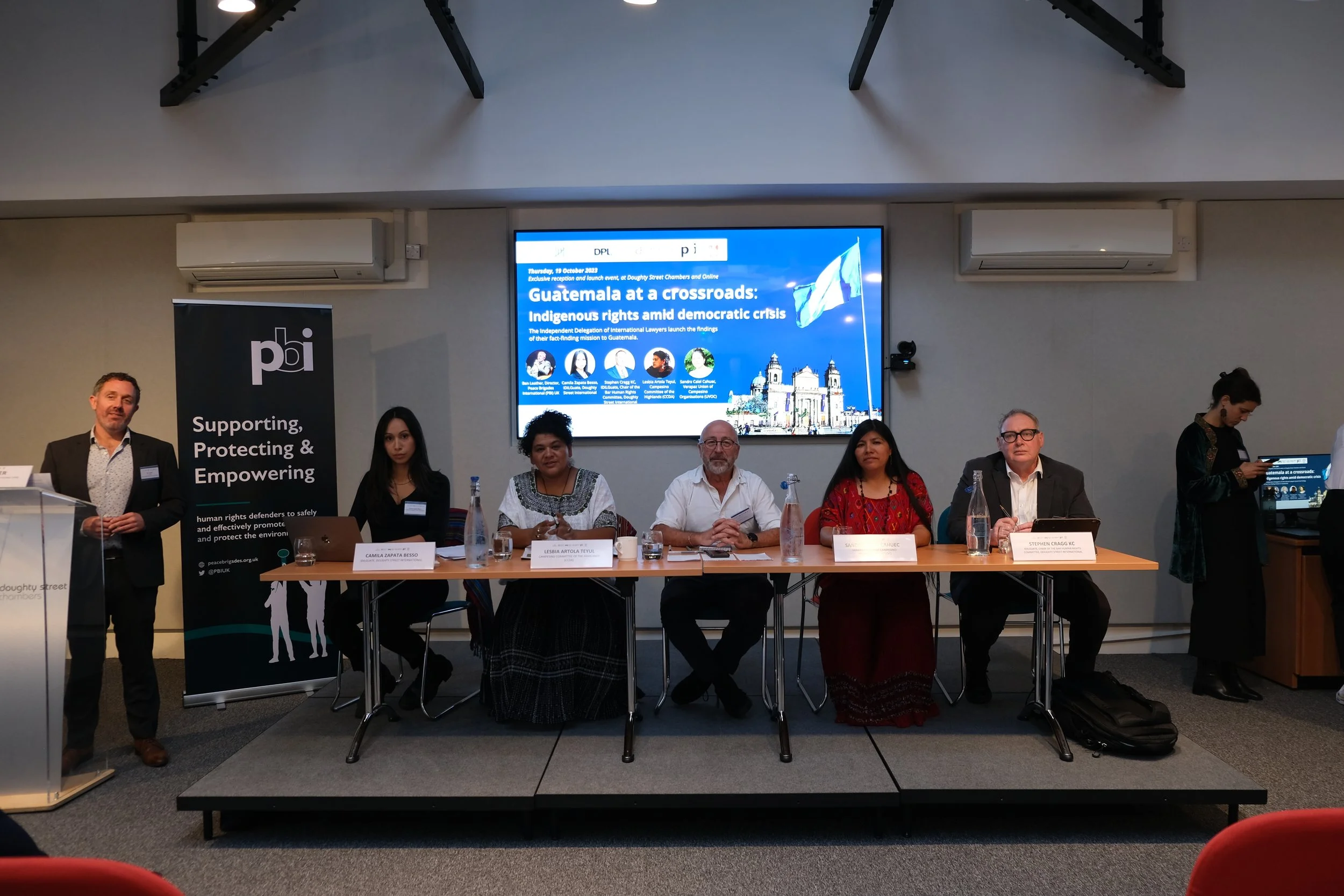Celebrating International Day of the World’s Indigenous Peoples at PBI UK
Indigenous People’s Rights - The theory versus the reality
By Lorna Ní Shúilleabháin, former field volunteer with PBI in Guatemala
This year to celebrate the International Day of the World’s Indigenous Peoples, we are exploring the rights of Indigenous peoples in Guatemala - where there are laws in place to protect Indigenous communities, but the reality is that these laws are not being enforced
Approximately 43.75% of Guatemala’s population belong to Indigenous communities. Rights, laws and mechanisms exist to protect these Indigenous peoples. However, PBI has seen that these laws and mechanisms are not being implemented on the ground and Indigenous communities suffer grave human rights violations. From January to November 2023, the Unit for Protection for Human Rights Defenders (UDEFEGUA) reported 5,965 attacks against human rights defenders in Guatemala, with many of these being Indigenous defenders. Of the reprisals against defenders in Guatemala reported by the Business and Human Rights Resource Centre between 2015 and 2023, 42% were against Indigenous defenders. 37% involved a failing in the judicial system. In 28% of the cases, the attacked defender is fighting to defend their land against a mining company.
The Theory of Indigenous Peoples’ Rights
In Guatemala in 1995, the Agreement on Identity and Rights of Indigenous Peoples was signed. This agreement acknowledges the identity of Indigenous peoples and their cultural, civil, political, social and economic rights. It recognises the right of Indigenous peoples to own and use the lands and resources they have traditionally owned. It states that nobody can develop activities on Indigenous lands without prior consultation.
Land rights appear again in Guatemala’s Constitution. Article 67 of the Constitution talks about the special protection that the State must give to Indigenous lands. Article 68 states that with special programmes the State shall provide State lands to Indigenous communities that need them for their development.
Guatemala has ratified the UN Convention on the Rights of Indigenous People. This Convention states that Indigenous communities have the right to all the universal human rights and fundamental freedoms recognised by the UN. This includes the right to water, the right to shelter, the right to land, the right to justice and many more rights that, as we will see later, are being violated.
Convention 169 of the International Labour Organisation, to which Guatemala is a signatory, protects the rights of communities to consultation prior to the construction of projects within their territories.
The protocol for police action during evictions states that police must not carry firearms when undertaking a forced eviction. The leader of the community must be notified in writing of the eviction and the whole community must be provided with shelter and food following the forced eviction.
The Reality of Indigenous Peoples’ Rights
According to PBI's observations of the situation on the ground, these laws and treaties are not being implemented in Indigenous communities. Human rights defenders continue to report the use of disproportionate force during forced evictions. There have been cases of homes and possessions being burned and destroyed. Communities are often not notified in a timely manner of the eviction. These forced evictions are a direct attack on the rights to housing, shelter, land, food security. The lack of prior notification of forced evictions violates the right to defend the land. The Comité Campesino del Altiplano (CCDA) and the Unión Verapacense de Organizaciones Campesinas (UVOC), two Indigenous groups supported by PBI, continue to report forced evictions where there is violence, often perpetrated by armed police officers. These issues were documented in detail by a recent high-level delegation of international human rights lawyers to Guatemala in their report We Are Not Trespassers, This Is Our Land.
Communities continue to suffer at the hands of extractive industries using their land without prior, free and informed consent. The clay extraction companies in Chinautla continue to operate without a licence, dumping rubbish in the Las Vacas Rivers which has led to health issues amongst the communities. Defenders of the Maya Ch’orti Indigenous Council of Olopa have been criminalised for their fight for the access to water in their communities. Tituque, a community in Olopa, had their water cut off for almost two months. This is a clear violation of the right to water. Seven hydroelectric plants currently operate on the Cahabón River, the licences for which were granted without consulting the communities in Cahabón. PBI has observed that many indigenous defenders are criminalised in their peaceful opposition to mega extractive industry projects
PBI’s team in Guatemala supports the Council of Communities of Retalhuleu (CCR) who defend the right to access to water and land in the south of the country. Communities in the department of Retalhuleu suffer the effects of the sugar industry in Guatemala. The communities do not have sufficient water for their consumption and agriculture, and young people are forced to migrate because of the health issues caused by the impacts of the sugar industry. Harvest is lost and biodiversity is damaged, meaning small scale agriculture is extremely difficult.
Proactivity of Indigenous Peoples to Promote Laws and Protections
Indigenous communities and organisations have been forced to defend their natural assets, environment and territory. On May 31 2024 hundreds of ancestral authorities and Indigenous organisations presented the Biodiversity and Ancestral Knowledge bill, known as the Peoples' Law. The aim of the law is to ensure the respect, acknowledgment and preservation of the traditional knowledge and practices of Indigenous and campesino communities, along with the biodiversity in their lands and harmonious coexistence with communities.
The Water Law Framework Initiative 5070 proposes a new law aimed at empowering communities to manage their water resources and ensuring their right to be consulted on any agribusiness or mining projects in their areas. Civil society and grassroots organisations including the Council of Communities of Retalhuleu (CCR) have united to form Campaña Agua Para la Vida and have highlighted what should be included in the water legislation.
In February 2024, the CCDA and UVOC signed The Agrarian Agreement with the Bernardo Arévalo’s government and two other campesino organisations, the Day’ Ch'orti' Campesino Central Coordinator (CCCND) and the Committee for Peasant Unity (CUC). The objective of this agreement is to create a mechanism to address the urgent and multiple agrarian conflicts in Guatemala. This is a landmark agreement. It supports the wellbeing of Indigenous communities by implementing measures that improve access to land.
The Theory Does not Match the Reality
In theory, there are laws to protect Indigenous peoples rights in Guatemala. However, this is not what is observed on the ground. When carrying out its activities to support and protect Indigenous defenders in Guatemala, PBI’s team has seen first hand the lack of adherence and implementation of these laws, which results in harms suffered by Indigenous communities and human rights defenders. Indigenous communities continue to seek justice with campaigns, initiatives and human rights movements.
Arévalo’s government is seeking to improve the attention and involvement of ministries when it comes to forced eviction and a new directive is being drawn up for the National Civil Police. While it is positive to see some movement from the government, the true failure lies in the justice system, the Public Prosecutor's Office, the Prosecutor's Office against Usurpation Crimes, landowners and the extractives sector, where we continue to see human rights violations.
What can you do?
Due to the failure to enforce laws that protect Indigenous peoples’ rights, it is crucial for governments, civil society organisations, and international bodies to increase pressure to ensure these laws are implemented. This requires backing existing legislation and supporting initiatives and campaigns led by human rights defenders.
On this International Day of the World's Indigenous Peoples, we invite you to reflect on the numerous challenges faced by Indigenous communities around the globe. From land dispossession and cultural erasure to social and economic marginalisation, Indigenous peoples continue to confront significant obstacles. Despite these hardships, Indigenous human rights defenders persist in their brave and unwavering efforts to protect their land, culture, and communities.
At PBI, we deeply acknowledge and honour the extraordinary work of Indigenous rights defenders. Their relentless dedication and advocacy are crucial in the ongoing struggle for the protection and implementation of Indigenous peoples’ rights. As an organisation, we remain steadfast in our commitment to supporting these defenders. We strive to create a world where Indigenous rights are not only recognised but also upheld and celebrated.
Let us use this day as an opportunity to amplify the voices of Indigenous human rights defenders and to reaffirm our solidarity with their cause. Together, we can work towards a future where justice, equality, and respect for Indigenous communities are realised.
➜ To find out more about the Indigenous communities that PBI supports in Guatemala, click here!
➜ You can help our global teams to mobilise, advocate, protect Indigenous, land and environmental defenders - and uplift their impact - by donating to PBI here!
➜ Access a summary of and the full report by the Independent Delegation of International Lawyers to Guatemala on agrarian conflict and Indigenous peoples' rights in Alta Verapaz here!
➜ Express your support for a new UK law to incentivise companies to take action to prevent environmental and human rights abuses from happening, and hold companies accountable if they fail to do so, by signing the Corporate Justice Coalition’s petition and sharing it with others!
➜ Find out more about the call by more than 45 human rights organisations for the UK Government to develop an effective and holistic policy for the protection of human rights defenders here!



